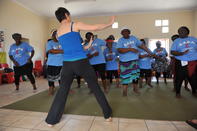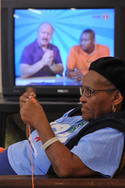The GAPA Grannies

I would go to GAPA and just sit in front of the television, paralysed by my pain. The GAPA grannies saved me. Goldie Qayiya was one of the women who came to talk to me, telling me how her three children, too, had died. She said, 'Alicia, my youngest son died when I sent him to the shop and he was struck by lightning.
Then my eldest boy, Vusi, died of Aids. I was at his bedside when he went; it broke my heart. Then my Thumela died of Aids. I buried them all.' When she shared her story, crying too, I realised I was not alone. 'Goldie has accepted her suffering and she is strong,' I thought. 'My world will not end; God is with me too.' Slowly, I became Alicia again.
When I'm worried at home, I go to GAPA and tell them about it, they who give me that comfort, that counselling, that I need. I'll never leave GAPA. It's deep in my heart. My closest friend at GAPA is Constance Sohena. When I'm in a crisis, I go to her house. First we kneel and pray, then I tell her whatever it is that is troubling me. She is the lady I trust the most.
Beauty Skefile’s GAPA Time

I like going to GAPA. It is a big help in my life. We talk a lot about our worries there and soon you've forgotten you've got any worries at all. This one says one thing, another one says something else, and soon we're all laughing. I used to go every day that the children were at school. But now my legs are sore with arthritis, so I can't walk there anymore.
And sometimes when you are there, your fingers don't want to hold anything. When I am at GAPA, I knit blankets and teddy bears. I also sew mfitshi-mfitshi, which means 'bits and pieces', the Xhosa words for patchwork. Sometimes I sew with the machine and sometimes I sew by hand. I sewed the cushions on my bed myself, by hand. Some things I didn't know when I was young, I'm learning now that I'm old.
By Jo-Anne Smetherham